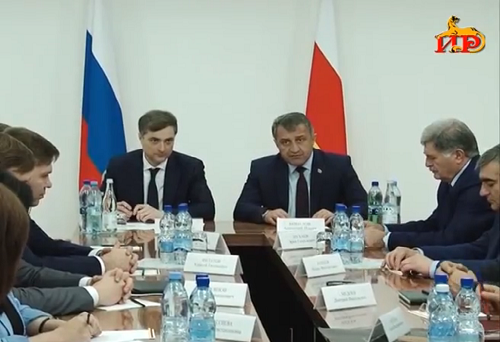| Kremlin Aide Visits Tskhinvali, Speaks of ‘Deeper’ Integration |
| Civil Georgia, Tbilisi / 12 Jun.'17 / 12:06 |

Vladislav Surkov and Anatoly Bibilov at a meeting of new South Ossetian cabinet of ministers, June 9, 2017. Photo: screengrab from local TV station IR
Russian President’s aide Vladislav Surkov, who oversees Georgia’s Abkhazia and South Ossetia regions, visited Tskhinvali on June 8-9, and discussed, among other issues, the region’s further integration with the Russian Federation.
Surkov, who is deeply implicated in all political decisions of the two regions, held meetings with Anatoly Bibilov, new South Ossetian leader, as well as the new government and parliamentary chairman Piotr Gassiev.
At a meeting with Anatoly Bibilov on June 8, Vladislav Surkov said that the purpose of cooperation between Moscow and Tskhinvali “should ultimately be the common cultural, legal, defense, economic space.” Surkov added that the goal was “realistic,” and would be reached “in due time.”
He also said that “a new era” was starting in South Ossetia with the election of Anatoly Bibilov, and thanked Bibilov for his consistent support of Tskhinvali’s integration with Russia. “You are the [new] president, therefore, there will certainly be some changes to the policy, be it economic, integration with Russia or other areas of state-building. We are open to dialogue, ready to accept these novelties, discuss them together and I think that, overall, we will support them, since we have long known each other,” the Kremlin aide noted.
Vladislav Surkov spoke on South Ossetia’s further integration with Russia in the region’s legislature as well. The Kremlin aide stressed that “the integration needs to be deeper and comprehensive,” since the present level of integration is “far from the ideal, from the level of integration, which Russia and South Ossetia are objectively aspiring to.”
“We also have sceptics [in Russia], who think that the current state [of integration] is already sufficient and we can stop at that, but the prevailing position is that closer, tighter cooperation is necessary, including for greater security of South Ossetia and most importantly, for raising the living standards of the population,” Surkov stated, adding that Moscow would “strive to ensure that the living standards in South Ossetia come close to that of Russia.”
“I hope for your support in this matter,” Surkov told the legislators. “Back then [when the “alliance and integration” treaty was being negotiated], it was only thanks to the support and the principled position of the parliamentary chairman (Anatoly Bibilov served at the post in 2014-2017) and the parliamentary majority, that we managed to agree on the version of the treaty that was desirable for Russia,” Surkov said.
Surkov added that the work on implementing Moscow’s “alliance and integration” treaty with Tskhinvali would continue, which would require adoption and ratification of a number of new laws.
During his two-day visit to Tskhinvali, Surkov and Bibilov together inspected a number of sites being constructed in the Region with the Russian funding, including the Holy Trinity temple of the Russian Orthodox Church in Tskhinvali. The two also co-chaired the meetings of Russian and Tskhinvali officials dedicated to the reconstruction of the “Iryston” hotel and the ongoing construction of a local theatre.
In Tskhinvali, Vladislav Surkov was accompanied by Denis Travin, deputy head of the Office of the Russian President for Social and Economic Cooperation with the CIS member states, Abkhazia and South Ossetia, and Alexey Filatov, chief adviser in the same unit.
